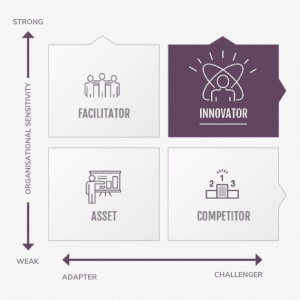
Talent Grid
Our vision on leadership
Talent Grid
SUCCESSFUL LEADERS ARE RARE
What truly makes them successful? Based on years of experience, we developed the Talent Grid: a practical model for clear dialogue on leadership qualities.
The Talent Grid is based on two dimensions: the ability to provide direction, confront, and take action (the challenger axis) and the ability to connect, empathize, and engage people (the sensitive axis). Crossing these axes yields four behavioral typologies: the Innovator, the Competitor, the Facilitator, and the Asset.
The Innovator as a Successful Leader
All four ideal types (Facilitator, Innovator, Asset, and Competitor) have their own value. However, our research shows that the ‘Innovator’ is the truly successful leader—and statistically in the minority. The Talent Grid combines two dimensions that are not easily united.
People who are natural challengers and push their environment do not necessarily score high in emotional sensitivity. Conversely, people with strong interpersonal awareness are generally not dominant or inclined to steer things their way.
“All four ideal types have their own value, but our research shows the ‘Innovator’ is the truly successful leader.”
Recognizing the Innovator is therefore critical. Knowing the other three types is also valuable. Each type has specific qualities that influence how well a person fits the role, the goals to be achieved, and the specific organization.

